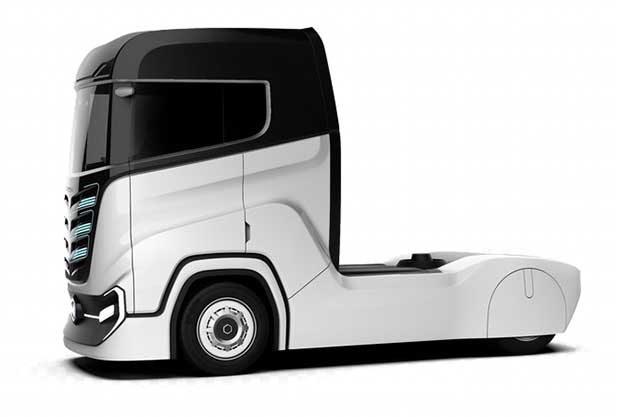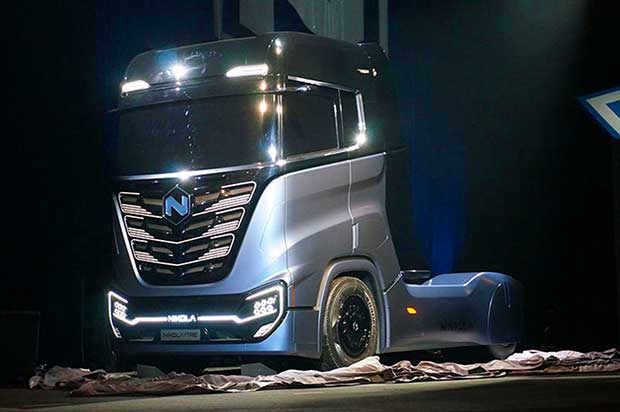
With the signing of a historic agreement between Nikola Corporation and Plug Power, the future of hydrogen fuel cell trucking is poised to get a major boost. This agreement between the two companies, who are both leaders in the hydrogen fuel cell trucking industry, is expected to revolutionize the way goods are transported across the world. The agreement will see Nikola Corporation and Plug Power join forces to design, develop, and manufacture 75 Nikola Tre hydrogen fuel cell trucks. In this agreement Nikola will buy 30 metric tons / day of the Plug Power fully integrated hydrogen liquefaction system for the Arizona Hydrogen Hub Project. Moreover, they will also build a network of hydrogen fueling stations to support these trucks. This agreement not only sets the stage for the future of hydrogen fuel cell trucking, but it is also expected to create new jobs, reduce emissions, and help to move the world towards a cleaner, more sustainable future.
Overview of Nikola Corporation and Plug Power
Nikola Corporation is a fuel cell company that was formed in 2014. Its mission is to design, manufacture, and sell hydrogen fuel cell technologies for the commercial trucking industry. In 2017, the company unveiled its hydrogen-electric truck, the Nikola One. The Nikola One has a range of 800 miles and can run for 1,200 miles on a full tank of hydrogen. The truck is powered by two hydrogen fuel cells that produce approximately 800 horsepower and 2,000 foot-pounds of torque, which are used to drive the vehicle’s electric motors. These fuel cells combine hydrogen and oxygen to produce electricity, heat, and water.
Hydrogen is an abundant source of fuel that has around four times the energy content of gasoline. It is also an emissions-free source of energy. This means that trucks powered by hydrogen fuel cells produce no emissions when operating. Plug Power is a company that specializes in hydrogen fuel cell technology. It was established in 2003, and is headquartered in Latham, New York. The company designs, develops, and markets hydrogen fuel cell systems and components that are used in a variety of industries. Among these industries are agriculture, aviation, rail, and trucking.
Details of the Historic Agreement
Through this collaboration, both companies are expected to help revolutionize the industry. In an effort to achieve this, the companies will share each other’s technical know-how. They will also work together to source parts and components. Moreover, they will work side by side to share costs and risks. This partnership is expected to see the two companies work together to create a system that is safe and reliable. This historic agreement has the potential to make a significant impact on the commercial trucking industry. This is because it is expected to make hydrogen fuel cell technology more accessible to truck drivers. Moreover, this is expected to simplify the process of acquiring and using hydrogen fuel cell tech.
Benefits of the Agreement
This agreement is expected to have several benefits for both Nikola Corporation and Plug Power. For Nikola Corporation, this agreement will help to realize its vision of a world powered by clean energy. This is because it will see the company’s technology used to power trucks. Moreover, the hydrogen fuel cell trucks that are designed and manufactured as a result of this collaboration will be responsible for producing zero emissions. This agreement is also expected to benefit Plug Power. This is because it will help to grow the company’s business. Additionally, it will also help to expand the company’s portfolio. This will be achieved by designing and manufacturing hydrogen fuel cell systems for the trucking industry. Given that Nikola Corporation is a leader in the hydrogen fuel cell trucking industry, this collaboration is expected to help Plug Power enter this new and growing market.

a. Job Creation
As part of the agreement between Nikola Corporation and Plug Power, these two companies will share the costs associated with building and operating hydrogen fueling stations. This will help to create new jobs in the industry. Moreover, it will also help to sustain existing jobs in the hydrogen fuel cell trucking industry. This is because the partnership between Nikola Corporation and Plug Power is expected to make hydrogen fueling stations more accessible to truck drivers. This will simplify the process of acquiring hydrogen fuel. It will also make it easier for truck drivers to use hydrogen fuel to power their trucks. This simplified process is expected to increase the number of truck drivers who use hydrogen fuel to power their trucks. This is because it will make this process easier and more convenient. This is expected to result in more truck drivers using hydrogen fuel.
b. Reduction in Emissions
Hydrogen fuel cells are an emissions-free source of energy. This means that the trucks powered by hydrogen fuel cells produce no harmful emissions. The CO2 emissions from the operation of these trucks are also significantly lower than those created by diesel-powered trucks. This agreement is expected to help reduce the harmful emissions that are released into the atmosphere as a result of transporting goods. This is because it will see Nikola Corporation and Plug Power design and produce hydrogen fuel cell trucks. Moreover, the two companies will build a network of hydrogen fueling stations to support these trucks. This network is expected to reduce the amount of diesel-powered trucks that are used to transport goods. This is because it will make it easier for truck drivers to use hydrogen fuel to power their trucks.
Improved Sustainability
Hydrogen fuel cells generate energy by combining hydrogen and oxygen to produce electricity and water. This is expected to help improve the sustainability of the trucking industry. This is because it will result in more trucks powered by hydrogen fuel cells. This, in turn, is expected to reduce the amount of diesel-powered trucks in the industry. Consequently, this is expected to help improve the sustainability of the trucking industry. This is because it will reduce the amount of harmful emissions released into the atmosphere as a result of trucking activities. It will also reduce the amount of CO2 emissions that are released.
Challenges and Risks
This agreement between Nikola Corporation and Plug Power is expected to be a challenge. This is because it is expected to see the two companies work together to design, develop, and manufacture hydrogen fuel cell trucks. Moreover, they will also be responsible for building a network of hydrogen fueling stations. This will be a significant challenge, given that both companies are new to this field. However, this agreement is also expected to be a risk for both companies. This is because it will require Nikola Corporation and Plug Power to share costs and risks. They are also expected to share each other’s technical know-how. This will be a risk because it is unclear how each of the two companies will benefit from the collaboration.
Implications for the Future of Hydrogen Fuel Cell Trucking
The agreement between Nikola Corporation and Plug Power has the potential to revolutionize the way goods are transported across the world. This is because it will see hydrogen fuel cell technology become more accessible to truck drivers. Moreover, it will also simplify the process of acquiring and using hydrogen fuel cell technology. This simplified process is expected to result in more truck drivers using hydrogen fuel to power their trucks. This is expected to reduce the amount of CO2 emissions that are released into the atmosphere as a result of trucking activities. It will also reduce the amount of harmful emissions released into the atmosphere. With this agreement, Nikola Corporation and Plug Power are expected to help move the world towards a cleaner, more sustainable future.
Citation
Comments are closed here.